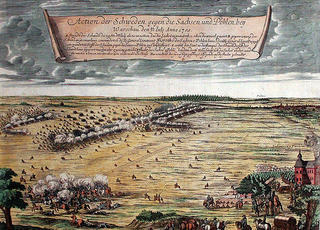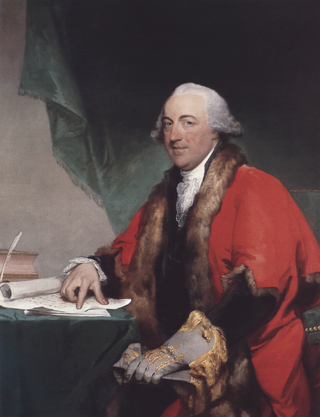Related Research Articles

1705 (MDCCV) was a common year starting on Thursday of the Gregorian calendar and a common year starting on Monday of the Julian calendar, the 1705th year of the Common Era (CE) and Anno Domini (AD) designations, the 705th year of the 2nd millennium, the 5th year of the 18th century, and the 6th year of the 1700s decade. As of the start of 1705, the Gregorian calendar was 11 days ahead of the Julian calendar, which remained in localized use until 1923.
Newport most commonly refers to:

Henry Cruger Jr. was an American and British merchant at the time of the American Revolution. He has a unique distinction of having been elected to both the Parliament of Great Britain and the New York State Senate (1792–1796).

Sir Robert Holmes was an English Admiral of the Restoration Navy. He participated in the second and third Anglo-Dutch Wars, both of which he is, by some, credited with having started. He was made Governor of the Isle of Wight, where he is buried in Yarmouth Parish Church.

Jeremiah Dummer was an important colonial figure for New England in the early 18th century. His most significant contributions to American history were his A Defense of the New England Charters and his role in the formation of Yale College.
Yarmouth was a borough constituency of the House of Commons of England then of the House of Commons of Great Britain from 1707 to 1800 and of the House of Commons of the United Kingdom from 1801 to 1832. It was represented by two members of parliament (MPs), elected by the bloc vote system.
Thomas Holmes, 1st Baron Holmes was a British politician who was Vice-Admiral and Governor of the Isle of Wight (1763–4) and sat in the House of Commons between 1727 and 1774. He managed elections in the government interest in the Isle of Wight during the 1750s and 1760s.
Alexander Gordon may refer to:
Hans Sloane, later called Hans Sloane-Stanley, was a politician who sat in the House of Commons between 1768 and 1806.

Sir Richard Worsley, 7th Baronet,, of Appuldurcombe House, Wroxall, Isle of Wight, was a British politician who sat in the House of Commons between 1774 and 1801. He was a noted collector of antiquities.
De Grey may refer to:
William or Bill Stephens may refer to:


Thomas Dummer (1739–1781) was an English Member of Parliament for Newport (1765–1768), Yarmouth (1769–1774), Downton in Wiltshire (1774), Wendover in Buckinghamshire (1775–1780) and Lymington in Hampshire (1780–1781).

Thomas Lee Dummer was an English Member of Parliament for Southampton (1737–1741) and Newport (1765–1768).

Edmund Dummer (1663–1724) was an English lawyer who was appointed "Clerk of the Great Wardrobe" under Queen Anne in 1706, holding that office until 1721.
Richard Dummer was an early settler in New England.

Jeremiah Dummer was the first American-born silversmith, whose works are today highly valued, two items of his having sold in 2004 and 2007 both for $204,000. He was also noted as a portrait painter and as an engraver, who created the first paper currency in Connecticut Colony. His son Jeremiah Jr. was involved with the foundation of Yale University.
Rev. Shubael Dummer was an American Congregational church minister who was killed in the Candlemas Massacre in York, Massachusetts Bay Colony. Described as a man of "beautiful Christian character", Dummer founded the First Parish Congregational Church of York, the oldest church congregation in the U.S. state of Maine.